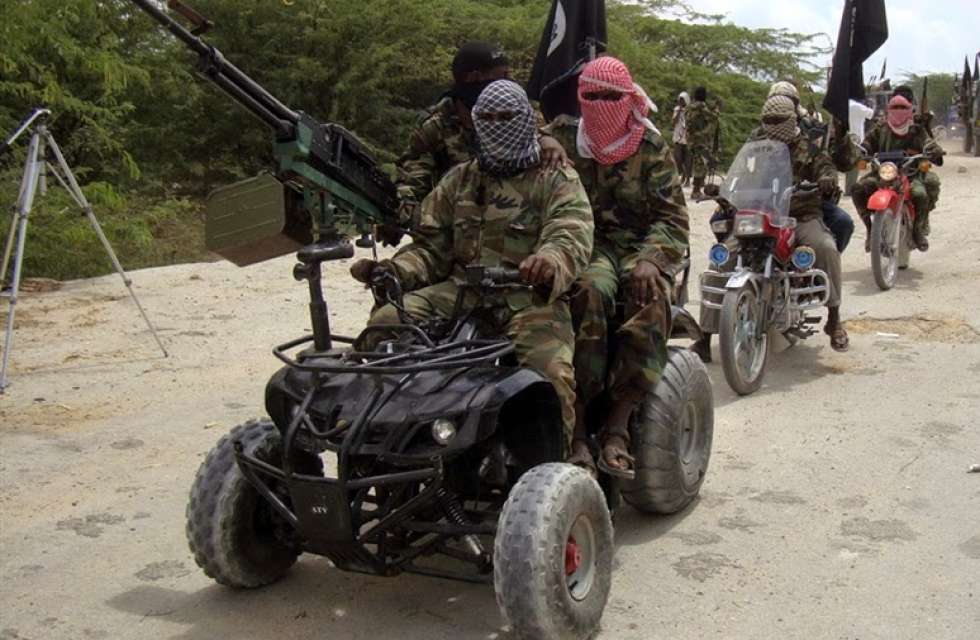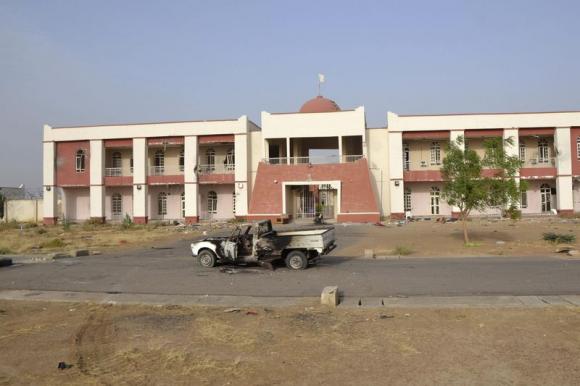NO fewer than 70 Boko Haram members were killed Tuesday by troops backed by civilian vigilantes in a foiled attack to capture Konduga town near Maiduguri in Borno State.
A would-be suicide bomber was killed before he could ram his explosives-laden car into a military checkpoint in the town during the attack on Monday, witnesses said.
The United Nations (UN) has condemned the recent attacks in Nigeria by the Boko Haram insurgents.
Speaking on the issue, UN Secretary General Spokesperson Stephane Dujarric condemned “the continuing indiscriminate and horrific attacks by Boko Haram against civilian populations in Cameroon, Chad, Niger and Nigeria. The abduction and use of children as “suicide bombers”, is particularly abhorrent.”
Spokesperson for the United Nations Refugee Agency (UNHCR), Adrian Edwards, disclosed yesterday that the agency would begin the relocation of about 66,000 Nigerian refugees in Cameroon today.
President Goodluck Jonathan has assured the international community that utmost care was being taken by the government to avoid collateral damage to the lives and properties of civilians in the area in the war against insurgents.
Around 150 Boko Haram fighters entered the fishing town with a large herd of cattle pretending to be herders and opened fire on troops stationed in the community, leading to a six-hour gun battle.
“At the last count 73 Boko Haram gunmen were killed in the foiled attack,” a civilian vigilante, Butari Mala, told AFP.
“Among those killed was a suicide bomber who was shot inside his car loaded with explosives before he could reach his target,” he said.
“The rest fled into the bush but were pursued and bombarded by a fighter jet that was deployed from Maiduguri.”
A military source in Maiduguri, who requested anonymity because he was not authorised to speak to the media, confirmed Mala’s account, including the death toll.
The attack happened at about 7.00am and the gunmen abandoned the cattle as they approached a military post, said Konduga resident, Abba Kaka.
“Unknown to the Boko Haram gunmen herdsmen in Konduga had been asked to keep away from some designated no-go areas,” he added.
“So when the gunmen came in through these designated areas it was clear to soldiers they were not genuine herdsmen and they met the soldiers waiting for them,” Kaka added.
Soldiers and vigilantes have repelled more than a dozen attacks by Boko Haram on Konduga, which is some 35 kilometres southeast of Maiduguri.
Troops and vigilantes have been stationed in Konduga to prevent it from being used as a launchpad to attack Maiduguri, where the group was founded in 2002.
The latest defence of the town comes after a number of claimed Nigerian military successes, including the recapture of the town of Baga, on the shores of Lake Chad.
Soldiers, backed by armies from neighbouring countries have been involved in a fight-back against the militants, whose attacks have threatened regional security and upcoming elections in Nigeria.
The UN Secretary General, Ban Ki Moon commended the efforts of countries in the Lake Chad Basin Commission and Benin, with the support of the African Union,(AU) towards operationalising the Multinational Joint Task Force to counter the threat posed by Boko Haram in the sub region and called for further help from international partners to provide support to the regional efforts.
He however, encouraged the forces to ensure that international human rights laws, humanitarian laws and refugee laws are respected in the conduct of their operations. “He is concerned by the impact of combat operations on local populations in Cameroun, Chad, Niger and Nigeria, and calls on countries of the region to give the highest priority to the protection of refugees, returnees and internally displaced persons, including by providing them with life-saving support,” Dujarric said.
She added that the UN will scale up its humanitarian operations and increase its human rights monitoring in all the impacted countries.
“The UN Secretary-General is convinced that a military approach alone will not suffice to counter the Boko Haram insurgency. Only through a multidimensional approach that addresses legitimate grievances, past and current human rights violations, and the root causes of the conflict, will we be able to effectively respond to the barbaric threats posed by Boko Haram to regional peace and security and to local populations,” she stated.
Speaking at an audience with the new South Korean Ambassador to Nigeria, Noh Kyu-Duk, President Jonathan said that everything possible was also being done by the military to avoid human rights violations in the theatre of operations in the Northeastern states.
The President, who admitted that there might be some cases of isolated incidence of abuses, however, noted that such cases had been exaggerated for obvious political reasons.
“We are sticking to international best practices in prosecuting the war against terrorism and doing our best to ensure that we don’t have cases of human rights abuses in the Northeast.
“We are consistently monitoring the situation and have investigated previous reports of such abuses which were mostly blown out of proportion for political reasons. Our military has a reputation for discipline and we have insisted on that discipline and control for the safety of civilians in the Northeast.
“The purpose of the entire operation is to save our people from the brutal tyranny of Boko Haram, so we cannot tolerate human rights abuses or willfully impose further suffering on them,’’ President Jonathan said.
Jonathan also told Kyu-Duk that Nigeria’s entire security architecture was being reviewed, restructured and strengthened to ensure greater safety for Nigerians and foreign workers in all parts of the country.
“We are inviting all our friends in the international community, particularly those that are more technologically advanced, to complement our efforts to build a more secure and prosperous country in which our people and foreigners can live in peace and safety,”
The President urged the envoy and his Indonesian counterpart, Harry Purwanto, who was also at the Presidential Villa to present his letters of credence, to work for the strengthening of existing trade and economic relations between Nigeria and their countries.
Edwards, UNHCR spokesperson explained the need to relocate the people from the border areas because of the level of ongoing violence in the villages.
According to a statement from the National Information Officer for the United Nations Information Centre in Nigeria, Oluseyi Soremekun, Edwards made the disclosure at a meeting in Geneva, which was chaired by Director of the UN Information Service in Geneva, Corinne Momal-Vanian, and attended by the spokespersons for the World Health Organisation, the International Labour Organisation and the Human Rights Council.
According to Edwards, the far north of Cameroon at the weekend witnessed increased influx of refugees from Nigeria, numbering about 16,000 persons, who are being screened to sieve out possible members of the insurgents who may have pretended to be refugees. The influx of the refugees, he said was as a result of clashes in northeast Nigeria between regional military forces and insurgents.
Source: Guardian














